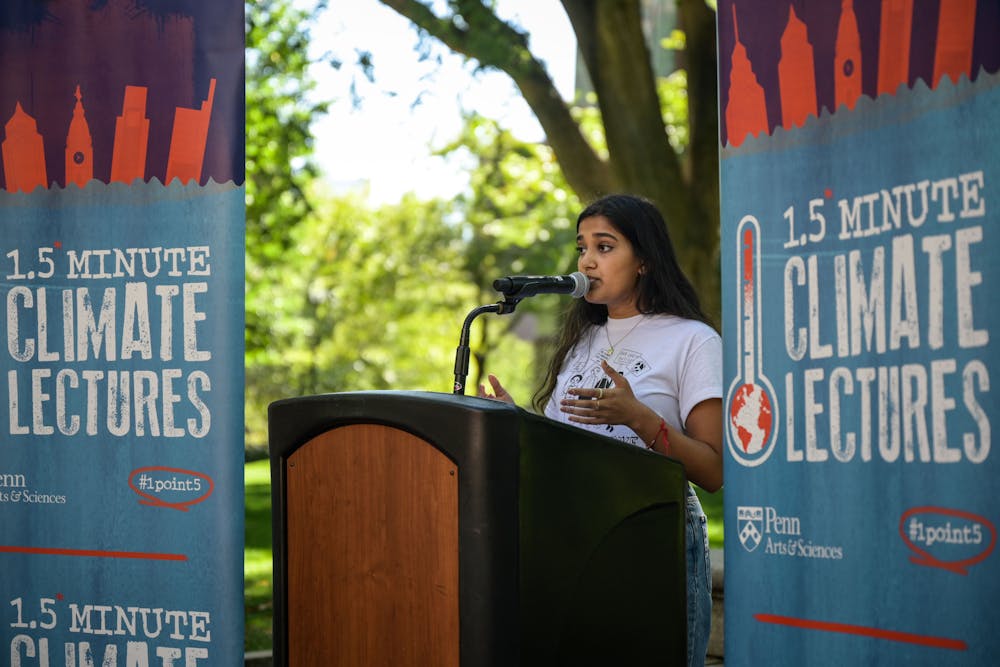Faculty, students, and staff across the University are hosting over 30 events for Penn’s Climate Week programming from Sept. 18 to 22.
The week’s schedule features panel discussions, research presentations, and film screenings on topics related to public health, social policy, and biodiversity, among others. Katherine Baillie, interim director of the Environmental Innovations Initiative, said that the range of sponsors for this year’s events, which include the Graduate School of Education and Wharton, is intended to appeal to Penn community members of all backgrounds and highlight the broad impact of the climate emergency.
Baillie said she receives proposals for Climate Week events from the greater Penn community on behalf of the Environmental Innovations Initiatives and ensures that they are shared as part of the formal programming. Beyond serving as an “umbrella organization” for the week’s events, she said that the structure is intentionally decentralized to encourage students, faculty, and staff across the University to proactively pursue any projects or events they are interested in.
Sustainability Director for the Penn Sustainability Office Nina Morris said in an interview with the Daily Pennsylvanian that Penn’s first Climate Week was held virtually in 2020, when several students collaborated with Class of 1942 Endowed Term Professor of German Simon Richter to bring awareness to the climate emergency.
“We think that climate change is something that impacts everybody — and not just in terms of where they live. People and places they care about, concerns for the future. And so when it actually concerns, whatever major discipline you're operating in, there's a climate connection there," Richter said.
The week began Monday with a “Pollinator Power” performance on College Green, which featured a local youth dance group paying tribute to the annual migration of monarch butterflies. Attendees were then led to Penn’s own student garden at Harrison College House for the dedication of a “monarch waystation.” Baillie said that this includes a specific standard of plant species that serve as a nectar source for monarch migration.
Events are set to continue throughout the week, including lectures, birding opportunities, and various workshops.
Masters student in environmental studies Chunran Yang, who serves on the organizing committee for Climate Week, told the DP that she was particularly looking forward to the Dean’s roundtable discussion on the impacts of climate change on health and health education.
The cornerstone of Climate Week, however, continues to be a series of “1.5-Minute Climate Lectures,” during which various students and faculty are invited to speak about climate change and how it relates to their own work.
Richter said that the significance of the “1.5 minutes” is that both students and faculty find it extremely difficult to stay within the timeframe, illustrating how difficult it is to remain under 1.5 degrees Celsius — the current rate of global warming. By the end of the month, several hundred people were stopping by to listen in, Richter added.
“There was just this feeling of relief and release. Because at that time, I think folks just had a feeling, that there was no conversation about climate at Penn,” he said. “And so this was an opportunity for people to come out and realize that there are many, many others who felt the same way.”
Richter added that student organizers involved in Fossil Free Penn played a key role in establishing the first set of climate lectures, as well as the first official Climate Week programming.
Since the conception of Climate Week in 2020, Baillie said that she has seen the impact of increased climate awareness in a variety of ways, including Penn professor Michael Mann’s decision to join the Penn community in 2022. Mann’s climate-related work has been significant, Baillie said, and she was excited that he would be contributing to the field as part of Penn’s faculty.
Richter also said that he has seen progress in climate awareness on campus in the form of buy-in at various levels of leadership. The commitment from University deans to the climate crisis, he said, has been meaningful in helping to communicate the urgency and impact of climate change outside of just the environmental studies department.
“It's such a huge and sprawling issue. That's a good thing,” Richter said. “That means that there's a place for everybody, there's a way that you can put your talents, your skill set to work — not just by recycling, but by doing something much more meaningful than that.”









